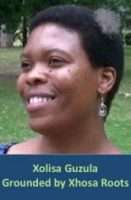Some people claim that ‘rural people tend to abandon their African languages once they acquire high levels of education’. However, without a doubt Xolisa Guzula – currently studying towards her PhD – is intent on doing just the opposite.
“Research shows that children learn better when they’re grounded in their mother tongue. When they know things first in their language, it’s easier to learn a second language,” she says, and then asks me whether we should conduct the interview in English or our shared mother tongue.
Xolisa holds a Bachelor of Primary Education, an MPhil in Education Administration, Policy and Social Planning and she is currently studying towards her PhD in Language and Literacy at UCT. She is now living in Rondebosch, but her journey started a long time ago and from deep in the Eastern Cape.
Born in historic 1976, Xolisa comes from rural Umhlanga. Her mother was a single mother who worked far away from home as she was making sure there was food on the table for her siblings and children.
“My granny raised me. There was a time where I didn’t know who my mother was, I thought my granny was my actual mother until I found out at school that she wasn’t,” she remembers.
You may say that teaching runs in the family because even though her grandma was illiterate she taught Xolisa so much.
“I had to write all their letters on their behalf. My granny would dictate to me what to write and asked me to read it to her to see if I wrote the correct message. I’d do the shopping lists and invitations that went from village to village,” she says.
While much of her early writing was out of necessity, she found that writing then developed into a solace for her. She could pour her heart onto the page and express her innermost thoughts.
Xolisa was also an avid reader. She recalls: “I was a quiet child who never spoke to anybody but who did read books. This helped me to write with greater meaning and purpose. I read my seniors’ books and fell even deeper in love with reading. But writing became more meaningful at home than it was at school – at school, teachers didn’t inspire us to write from the heart, it was all about repeating what was in the textbook.”
She says her attending a girls boarding school has also contributed to who she is today.
“When I went there I found other readers. Whenever we went home we would bring back magazines to share with each other at school. There was a trolley library that moved from class to class that had Readers Digest magazines as well as novels. More people fell in love with reading as time went on.”
The structure of school has also shaped Xolisa’s life. “There was time for bathing and breakfast. There was time for everything and that taught me discipline. You get used to having something to do and that everything has its own time. Being there taught me how to use my time effectively.”
After finishing school, she went to UCT. When completing her education degree, she didn’t forget her roots. “I made a conscious effort to take both English and isiXhosa as my languages at varsity. There was something inside me that said don’t leave isiXhosa behind. It even went further saying that Xhosa would take me anywhere.”
She realised early in her career that ‘language’ doesn’t mean ‘knowledge’. She says, “There’s a myth that if you know English then you’re ‘knowledgable’ – but this isn’t true.”
She then become a researcher for UCT looking at the learner progress and achievements of learners from schools in Khayelitsha. There were learners who were older than her still at school. Many of their problems stemmed from learning in a language that was not their mother-tongue.
After doing 18 months of the research she joined a project that promoted bilingual education.
“In 2001 I joined The Project for the Study of Alternative Education in South Africa (PRAESA). Bilingualism to us means that children learn through the medium of two languages and understand. We wanting best of both from our children.”
Their work at PRAESA didn’t end in promoting language at schools. “We also promoted ‘Intellectualisation of African Languages’ where you make African languages important and give it a high status in various domains such as hospitals and banks.”
She notes that they would advocate for banks to have ATM machines that were multilingual.
At PRAESA the next major move was to start the Nal’ibali campaign promoting reading for enjoyment and pleasure. “Our children don’t come back to parents who read to them. So while at school they may learn the technical skills but they lose out on this other part – the enjoyment factor. So we felt we wanted to do something that would put stories at the heart of literacy learning and get children be excited about reading,” she says.
She says charity begins at home and it’s her responsibility to ensure her two children are bilingual. “I enjoy listening to them juggling between two languages – I know that I’ve done my job!”
In 2012, Xolisa joined the Nelson Mandela Institute to continue with biliteracy training and mentorship, and to provide support for rural teachers.
“When I’m driving in the villages and I see small faces of these children waving to the passing cars, I remember that I was one of those children who never thought my world would become bigger,” Xolisa reflects.
But it certainly has: she has come back to Cape Town to complete her PhD. And, her interest in language development is not just theoretical. She runs a reading club in Khayelitsha and is actively engaged in promoting reading and literacy development. She has also written and translated a number of children’s books.
Xolisa hasn’t forgotten her roots or her language, it shapes all that she does and she’s using that knowledge and passion to help shape other people’s lives too.
***
Tell us what you think: How do you feel about your home language versus English? Do you support multilingualism?






